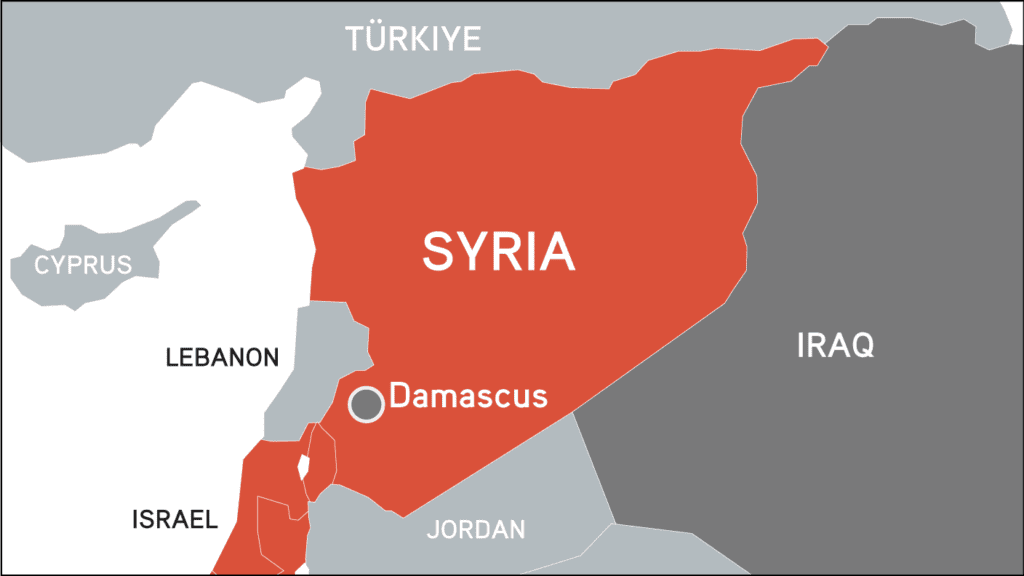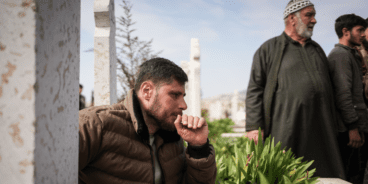Syria

Despite a political transition and significant decrease in hostilities, populations in Syria remain at risk of war crimes and crimes against humanity.
BACKGROUND:
On 8 December 2024 the government of President Bashar al-Assad was overthrown by a coalition of armed opposition groups, led by Hay’at Tahrir al-Sham (HTS), following a 12-day offensive. The collapse of Assad’s government occurred after nearly 14 years of an internationalized country-wide armed conflict between the government and opposition groups characterized by rampant atrocity crimes, including the illegal use of chemical weapons. At least 580,000 people were killed and 13 million Syrians forcibly displaced, according to the Human Rights Council-mandated Commission of Inquiry (CoI) on Syria. Despite the overthrow of Assad, hostilities between the Syrian National Army (SNA), Syrian Defense Forces (SDF) and various armed groups continue in northern Syria.
The conflict has its origins in the Assad government’s brutal suppression of pro-democracy protests in March 2011. Throughout the armed conflict, the Assad government systematically perpetrated extermination, murder, arbitrary detention, enforced disappearance, torture and ill-treatment and sexual violence, in what amounts to war crimes and crimes against humanity, according to the CoI. Armed groups, including HTS, the SNA, Turkish-backed groups and the so-called Islamic State of Iraq and the Levant (ISIL), were also implicated in atrocity crimes, such as torture, ill-treatment, systematic looting and arbitrary detention.
The CoI has reported over 130,000 arbitrary detentions, abductions or disappearances since 2011, with the majority attributable to the government. In the immediate aftermath of the collapse of the Assad government, HTS and other groups opened many state-run detention and prison facilities, including the notorious Sednaya prison. While thousands of people were released from arbitrary detention, a number of mass graves were discovered and many Syrians continue to search for missing relatives.
Tens of thousands of people with alleged affiliations to ISIL, mainly women and children, remain trapped in squalid detention camps run by the Kurdish-backed SDF. The CoI has reported that the conditions may amount to cruel or inhuman treatment and may constitute the war crime of outrage upon personal dignity.
During the conflict, the UN Security Council (UNSC) failed to hold perpetrators accountable, as well as sustain access for cross-border humanitarian aid operations. Russia and China repeatedly exercised their veto power, and resolutions that were adopted were either unsuccessfully implemented or directly violated.
Despite UNSC inaction, several processes were initiated to pursue truth, justice and accountability for Syrians. In December 2016 the UN General Assembly (UNGA) established an International, Impartial and Independent Mechanism (IIIM) to assist in the investigation and prosecution of perpetrators of atrocities in Syria. Several countries have initiated proceedings or convicted suspected Syrian perpetrators under universal jurisdiction. In June 2023 the UNGA established the Independent Institution on Missing Persons (IIMP) in Syria to clarify the fate and whereabouts of all missing persons and provide support to victims, survivors and their families. That same month, Canada and the Netherlands jointly initiated proceedings against Syria before the International Court of Justice (ICJ) concerning alleged violations of the Convention against Torture and Other Cruel, Inhuman or Degrading Treatment or Punishment.
RECENT DEVELOPMENTS:
In January 2025 drone strikes by the SNA in northern Syria around Tishreen Dam, killed 20 people and injured over 120 others. There have been escalating attacks against minority groups in Syria, including against the former government’s Alawite community. Between 6-9 March armed clashes erupted in Latakia, Hama and Tartus governorates after armed groups and individuals loyal to former President Assad ambushed security forces from the transitional government who were conducting a so-called “security campaign.” More than 1,000 people were killed, including hundreds of civilians, mostly from the Alawite minority group, who were reportedly specifically targeted.
Between December 2024 and February 2025 the CoI, IIMP and IIIM all conducted landmark visits to Syria, after being granted access for the first time since the establishment of their respective mandates. On 17 January the International Criminal Court’s (ICC) Chief Prosecutor met with transitional authorities in Syria to discuss cooperation on justice and accountability.
On 29 January the new de-facto leader of Syria, Ahmed al-Sharaa, was appointed as interim president and tasked with leading a transitional government until free and fair elections can take place. The interim administration has announced the dissolution of parliament, the 2012 constitution and all political parties. Several armed groups have agreed to disband and be merged under the Ministry of Defence. On 10 March the Kurdish-led SDF agreed to merge into state institutions. Between 24-25 February the transitional authorities hosted a National Dialogue Conference in Damascus. On 13 March interim President Sharaa adopted a constitutional declaration to govern the transitional process for a five-year period.
Over 235,000 Syrian refugees have returned to the country since 8 December 2024, according to the UN Refugee Agency. Several European states – including the United Kingdom, Austria, France, Sweden, Italy and Greece – have paused decisions on asylum applications for Syrian nationals while reevaluating the security situation. Austria has gone so far as to prepare a potential deportation program.
ANALYSIS:
While the ongoing political transition in Syria is a historic opportunity for Syrians to rebuild their country, the future remains uncertain. The transitional authorities have inherited a devastated economy and humanitarian crisis, which has left nearly the entire Syrian population reliant on aid.The transitional government must balance the urgency of rebuilding the country and restoring services with the need to address and remedy a legacy of serious human rights violations and atrocity crimes. The National Dialogue Conference, a pivotal moment for intra-Syrian collaboration, has faced concerns over its rushed organization, limited inclusivity and lack of transparency. Although the constitutional declaration upholds commitments to pluralism, transitional justice and the separation of powers, it has faced criticism for granting broad presidential powers, requiring the head of state to be Muslim and inadequately recognizing Syria’s political, ethnic and religious diversity.
Minorities across Syria’s governorates are at risk of targeted attacks and it remains to be seen if the agreement between the transitional authorities and SDF will ensure a nationwide ceasefire, including in the northeast where hostilities between the SDF, SNA and other groups have displaced and endangered thousands of civilians.
Though the government of Assad has collapsed, rights abuses continue, including the arbitrary detention of thousands in SDF-guarded camps. Justice and accountability must be pursued for victims of serious crimes committed by all perpetrators, including for crimes committed by HTS during the conflict.
RISK ASSESSMENT:
-
- Legacy of war crimes and crimes against humanity perpetrated by all parties to the conflict, particularly the former government.
- Impunity enjoyed by all perpetrators for atrocity crimes.
- Insecurity due to ongoing hostilities in northern Syria and escalating attacks against minorities.
- Weak institutions and economic devastation.
- Fragile political and security conditions because of an abrupt change in political power.
NECESSARY ACTION:
The transitional government must ensure a transparent, diverse and inclusive political process. Efforts to build national unity must be grounded in Syria’s political, ethnic and religious diversity, including protective provisions in the drafting of the permanent constitution. The National Dialogue Conference must serve as only the start of ongoing national consultations, for which inclusivity is essential. Executive power afforded to the interim president must not be abused, nor exceed the transitional period. Syrian authorities should continue to be guided by the core underlying principles of UNSC Resolution 2254, regarding a Syrian-led political transition, informed by the aspirations of the Syrian people and with assistance from the UN.
All parties to the conflict must uphold their obligations under international law, including ending attacks on civilians and civilian infrastructure, and facilitate unimpeded humanitarian access to civilians trapped or displaced by fighting. Transitional authorities should facilitate inclusive discussions with armed groups reluctant to disband, aiming to establish guarantees, define parameters and set a timeline for disbandment and integration. Authorities must condemn the targeting of minorities and ensure perpetrators in Syria’s coastal violence are held to account.
Syria should ratify the Rome Statute of the ICC, pursue justice and accountability, ensure the implementation of a comprehensive and holistic transitional justice process and maintain cooperation with all UN-mandated investigative mechanisms. The return of refugees and other displaced Syrians must be in accordance with the principle of non-refoulement.
Atrocity Alert No. 421: Syria, Haiti and Genocide Remembrance and Prevention
Related Content

Atrocity Alert No. 434: Sudan, Ethiopia and the UN Human Rights Council

Populations at Risk, March 2025
